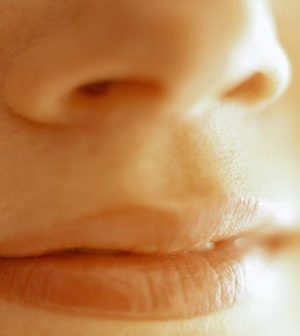- Recognizing the Signs of Hypothyroidism
- 10 Strategies to Overcome Insomnia
- Could Artificial Sweeteners Be Aging the Brain Faster?
- Techniques for Soothing Your Nervous System
- Does the Water in Your House Smell Funny? Here’s Why
- Can a Daily Dose of Apple Cider Vinegar Actually Aid Weight Loss?
- 6 Health Beverages That Can Actually Spike Your Blood Sugar
- Treatment Options for Social Anxiety Disorder
- Understanding the Connection Between Anxiety and Depression
- How Daily Prunes Can Influence Cholesterol and Inflammation
Kiss Chapped Lips Goodbye This Winter

Dry and chapped lips are common during the winter, but there are a number of things you can do to protect them, an expert says.
“Cold, dry weather; sun damage; and frequently licking your lips are just some of the reasons your lips might feel dry and chapped this winter,” dermatologist Dr. Noëlle Sherber said in an American Academy of Dermatology news release. “Understanding these causes and anything else that might trigger your chapped lips goes a long way in preventing and treating them.”
Sherber offered the following advice on preventing and treating dry, chapped lips:
- Use non-irritating lip products. Stick to lip balms, lipsticks and other lip products that contain ingredients like castor seed oil, ceramides, dimethicone or mineral oil. Choose products that are labeled “fragrance-free” and “hypoallergenic.”
- Avoid harsh ingredients. Camphor, menthol or eucalyptus can irritate your lips. If your lips burn, sting or tingle after using a lip product, stop using it.
- Refresh often. Apply your lip balm throughout the day and before you go to bed. If your lips are very dry and cracked, use a thick ointment, such as petroleum jelly. Ointment seals in moisture longer than waxes or oils.
- Protect your lips outdoors. Before going outside, apply a lip balm with an SPF of 30 or higher. Use a lip balm with titanium dioxide and/or zinc oxide and reapply it every two hours while outside.
- Don’t lick, bite or pick at your lips. It may feel natural to lick your lips when they feel dry, but this can worsen the problem. Instead of licking your lips, apply a non-irritating lip balm.
- Keep metal away from your mouth. Don’t hold metal items such as paperclips, jewelry and reusable metal straws with your lips. They can cause irritation.
- Stay hydrated. Drink plenty of water and use a humidifier at home, especially in your bedroom while you sleep.
“Chapped lips are usually harmless, however, sometimes they can be a sign of a medical condition,” Sherber said. “If your dry, chapped lips do not heal after following these tips for two to three weeks, talk to a board-certified dermatologist.”
More information
The U.S. National Library of Medicine has more on preventing chapped lips.
SOURCE: American Academy of Dermatology, news release, Jan. 26, 2021
Source: HealthDay
Copyright © 2026 HealthDay. All rights reserved.










